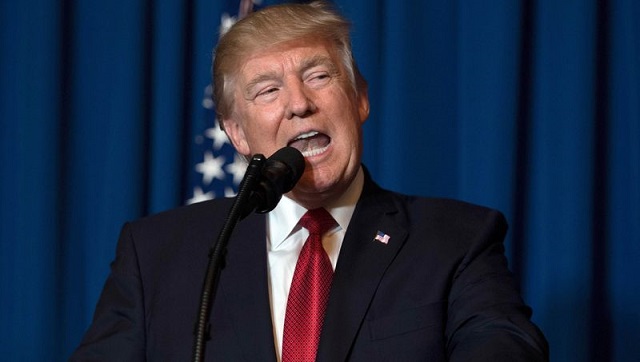
Washington, United States | AFP | President Donald Trump on Tuesday slapped down warnings of widespread Middle East unrest as he told anxious Arab leaders he still intends to move the US embassy to Jerusalem, on the eve of a much-anticipated policy speech.
Amid a frantic round of telephone diplomacy, Trump told Palestinian leader Mahmud Abbas and Jordan’s King Abdullah that the deeply controversial move was coming, but crucially did not give a timeframe.
Trump “informed the president (Abbas) on his intention to move the US embassy from Tel Aviv to Jerusalem,” the Palestinian leader’s office said in a statement that was echoed from Amman.
Trump missed a Monday deadline to decide whether to keep the embassy in Tel Aviv or fulfill a campaign promise and move it to Jerusalem — de facto recognizing Israel’s claim on the disputed city.
Such a move would delight both Trump’s donors and the conservative and evangelical base that is so vital for the embattled president’s survival.
But it could also extinguish Trump’s much-vaunted efforts to broker Middle East peace and ignite the flames of conflict in a region already reeling from crises in Lebanon, Syria, Iraq, Yemen and Qatar.
The 71-year-old president will give a speech on his decision Wednesday, White House press secretary Sarah Sanders said.
Anticipating widespread demonstrations, US government officials have already been ordered to avoid Jerusalem’s Old City and the West Bank.
– ‘Threading the needle’? –
US officials talk of “threading the needle” — fulfilling Trump’s pledge, while keeping the peace process on the rails — but critics say Trump’s approach is more like “splitting the baby.”
Officials say he will hold off on moving the embassy right away, largely for logistical reasons, but may present a timetable for that to go ahead on Wednesday.
Equally controversially, he is also expected to recognize Jerusalem as Israel’s capital, while leaving open questions about control of the predominantly Palestinian eastern part of the city.
The White House argues that such a move would not prejudge final talks and would represent the reality that west Jerusalem is and will continue to be part of Israel under any settlement.
But it could upend a decades-old western policy — observed by both Republican and Democratic presidents — that stated Jerusalem’s status can only be decided by negotiation.
Saudi Arabia’s King Salman warned his close ally that moving the US embassy was a “dangerous step” that could rile Muslims around the world.
“Mr Trump! Jerusalem is a red line for Muslims,” Turkey’s President Recep Tayyip Erdogan said in a raucous televised speech, echoing alarm expressed by Palestinian and Arab leaders.
In his address, Erdogan warned that any move to back Israel’s claim to the city would mobilize “the entire Islamic world” and even prompt Ankara to sever its recently renewed diplomatic ties with the Jewish state.
Israel’s government has largely been silent. It earlier left the Trump administration with the impression that moving the embassy was a “no go,” leading to Trump signing the waiver the first time around.
The armed Islamist Hamas movement has threatened to launch a new “intifada” or uprising.
Most of the international community, including the United States, does not formally recognize Jerusalem as Israel’s capital.
 The Independent Uganda: You get the Truth we Pay the Price
The Independent Uganda: You get the Truth we Pay the Price





